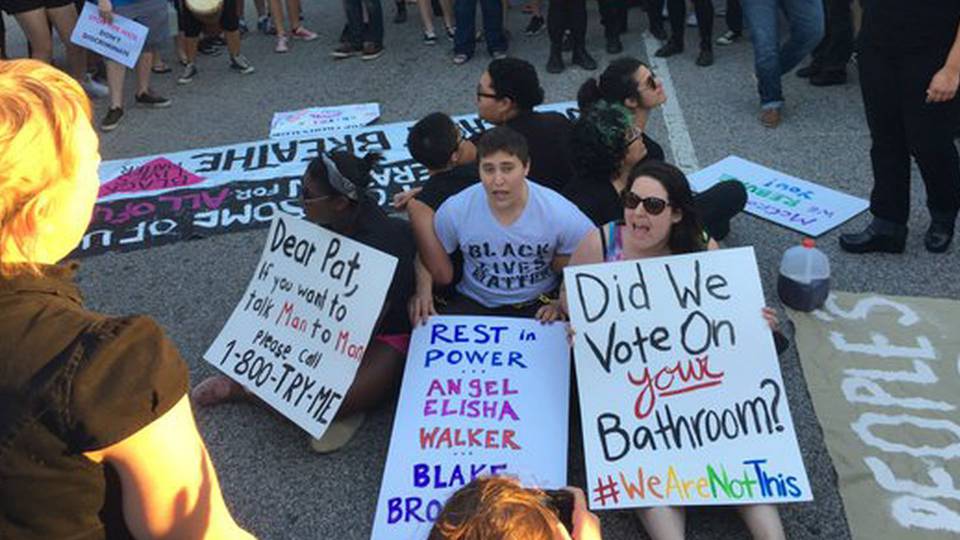
TheChronicleOfHigherEducation/28 de marzo de 2016/Por: Andy Thomason
Resumen: Una nueva polémica se ha desatado en las universidades de Carolina del Norte, en relación a una ley denominada HB2, la cual viola la enmienda 14 de la Constitución de Estados Unidos, al negar algunos derechos de los homosexuales y transgénero. Sin embargo, la semana pasada los legisladores de Carolina del Norte se reunieron en la sección espacial para aprobar la legislación de amplio alcance, en donde las empresas no pueden tomar medidas legales ante la discriminación en la contratación de personas homosexuales o transgénero. La HB2 fue motivada por una ordenanza aprobada en la ciudad más poblada del estado, Charlotte. El gobernador McCroy ha tratado de desacreditar las críticas de la ley, diciendo, por ejemplo, que no elimina las protecciones para los residentes de Carolina del Norte. Los críticos han dicho que las garantías son claramente falsas. La demanda presentada ante el tribunal federal fue realizada por unos empleados transgénero y homosexuales en la Universidad de Carolina del Norte en Chapel Hill. La demanda en contra de la HB2 fue motivada el trato que en ella se expresa para las personas transgénero y homosexuales, al despojarlas de la protección otorgada por la Ciudad de la Ordenanza de Charlotte, la cual se opone a que cualquier gobierno local adopte medidas para proteger a las personas contra la discriminación. Por tanto, esta ley hará más difícil para el campus atraer a los mejores profesores, estudiantes y personal en general. La comunidad deplora la negación a cualquier persona a la protección de la ley debido a su orientación sexual o identidad de género.
Organized opposition to a controversial new law in North Carolina is taking shape, and university students and faculty and staff members are playing a leading role.
On Monday, three individuals, all of whom work for or attend North Carolina colleges, and two advocacy groups sued the state over the law, known as House Bill 2, alleging it violates the 14th Amendment of the U.S. Constitution by denying gay and transgender people equal rights.
Last week, North Carolina lawmakers gathered in special section to pass the sweeping legislation, which, among other things, forbids cities and counties from passing ordinances that extend protections to gay and transgender people. As a consequence, critics of the law say, cities like Greensboro or Raleigh cannot take legal steps to, say, prevent businesses from discriminating against gay customers or employees.
House Bill 2 was prompted by an ordinance passed in the state’s most populous city, Charlotte, that allowed transgender people to choose the public restroom consistent with their gender identity, rather than their gender at birth. After the bill was passed and signed by Gov. Pat McCrory, Charlotte’s mayor, Jennifer Roberts, called it “literally the most anti-LGBT legislation in the country.”
Governor McCrory has sought to debunk criticism of the law, saying, for instance, that it does not remove protections for any North Carolina residents. Critics have said assurances like that are patently false.
Organized Opposition
The three individual plaintiffs in the lawsuit, filed on Monday in a federal court, are Joaquín Carcaño, a transgender employee at the University of North Carolina at Chapel Hill; Payton Grey McGarry, a transgender student at UNC’s Greensboro campus; and Angela Gilmore, a lesbian who is a professor and an associate dean at North Carolina Central University School of Law. The American Civil Liberties Union of North Carolina and the nonprofit group Equality North Carolina are also plaintiffs.
“H.B. 2 was motivated by an intent to treat LGBT people differently, and worse, than other people,” the lawsuit reads, in part, “including by stripping them of the protections afforded by the City of Charlotte’s Ordinance and precluding any local government from taking action to protect LGBT people against discrimination.”
Also on Monday, more than 50 Chapel Hill faculty members released a statement on Facebook condemning the law. (The statement clarified that professors were not speaking for the university.)
“The recently passed House Bill 2 makes it impossible for UNC-Chapel Hill and its surrounding communities to protect valued faculty, staff, and students from discrimination simply because of who they are,” the statement reads, adding that the law will make it difficult for the campus to attract the best professors, students, and staff.
According to the organization Campus Pride, Duke University was the first institution to issue a statement on the law, saying, “We deplore any effort to deny any person the protection of the law because of sexual orientation or gender identity.” Here is a partial collection of university statements.
On Saturday, the president of the NCAA, Mark Emmert, said he had spoken with Governor McCrory, and told him the association was committed to fostering an “inclusive” environment at sporting events. He added that he did not threaten to cancel any events scheduled to take place in North Carolina.






 Users Today : 64
Users Today : 64 Total Users : 35459970
Total Users : 35459970 Views Today : 80
Views Today : 80 Total views : 3418545
Total views : 3418545